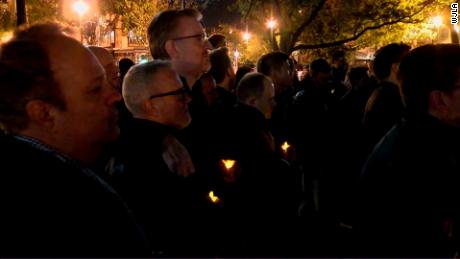"It's so important that we now have a home for Matt," his father, Dennis Shepard, said at the start of the service. "A home that others can visit, a home that is safe from haters, a home that he loved dearly from his younger days in Sunday school and as an acolyte in the church back home." The homily was given by the Right Rev. V. Gene Robinson, the first openly gay priest to be consecrated a bishop in the Episcopal Church.The National Cathedral in northwest Washington "considers LGBT equality the great civil rights issue of (the) church in the 21st century," its website says. It hosted its first same-sex wedding in 2010.Matthew Shepard's death helped galvanized the civil rights movement for LGBT people and led to the Matthew Shepard and James Byrd Jr. Hate Crimes Prevention Act, also named for a black man killed by three white supremacists in Texas. Shepard was a 21-year-old student at the University of Wyoming in October 1998 when he was robbed, beaten and tied to a fence and left for dead by two men he met in a bar. He died six days later, on October 12, 1998, at a hospital in Colorado.The two men were convicted of kidnapping and murder in the attack, which police said was initially a robbery. But, they said, Shepard was targeted because of his sexual orientation. Shepard's parents previously said the National Cathedral was the only place they believed their son's remains would be safe from desecration. "We didn't want to leave him in Wyoming to be a point of pilgrimage that may be a nuisance to other families in a cemetery," they said this month. "We didn't want to open up the option for vandalism. So we had him cremated and held onto the urn until we figured out the proper thing to do."
'Welcome home'
Jerry Morant told CNN the main space of the cathedral "was absolutely packed," but overflow seating was available for late entries. Morant went to the service "for many reasons … in part, because his tragedy became a rallying cry for those of us LGBT people who grew up then," he told CNN via Instagram.Tim Saxon also attended to pay his respects. He told CNN he was a "closeted freshman in high school in rural Ohio" at the time of Shepard's death, and that it "sent me deeper into that closet, believing that could easily have been me, and not him." "I came today to pay my respects to Matthew and his family," Saxon said, "and to help heal the deep wounds caused by his death to not only me, but the entire LGBTQ family."Not surprisingly, the service was an emotional one. At times it even got the best of Robinson, who told attendees he had been crying for a week. He celebrated not only Shepard's life but also the dedication of his parents, who have worked for two decades to cement their son's legacy and affect some positive change after their loss. "You know, they could have so easily gone home and grieved privately," he said. "But by the grace of God, they decided that they were going to turn this horrendous event into something good." Robinson also took time to reflect on the trials faced by America's marginalized communities — whether they be LGBTQ or people of color — and recognized that they are far from over.  He drew particular attention to the violence that transgender people face, as he did at a vigil Thursday night. "There are forces about that would erase them from America, deny them the right that they have to define themselves, and they need us to stand with them." Shepard, like everyone, was loved by God, Robinson said, and he imagined him on Friday sitting in God's lap, wrapped in his arms, "and that's all I need to know." In his closing, before carrying Shepard's ashes to a private interment ceremony, Robinson said he had three things he would want to tell Shepard. "Gently rest in this place. You are safe now." he said, his voice breaking with emotion. "Oh yeah, and Matt, welcome home."
He drew particular attention to the violence that transgender people face, as he did at a vigil Thursday night. "There are forces about that would erase them from America, deny them the right that they have to define themselves, and they need us to stand with them." Shepard, like everyone, was loved by God, Robinson said, and he imagined him on Friday sitting in God's lap, wrapped in his arms, "and that's all I need to know." In his closing, before carrying Shepard's ashes to a private interment ceremony, Robinson said he had three things he would want to tell Shepard. "Gently rest in this place. You are safe now." he said, his voice breaking with emotion. "Oh yeah, and Matt, welcome home."
CNN's David Williams, Emanuella Grinberg and Christina Maxouris contributed to this report.
Original Article
[contf] [contfnew] 
CNN
[contfnewc] [contfnewc]






